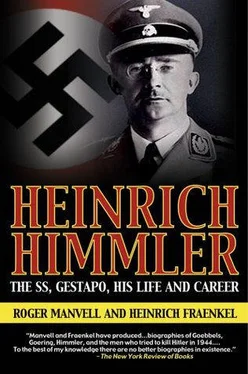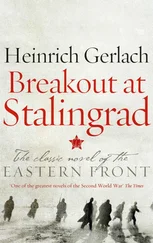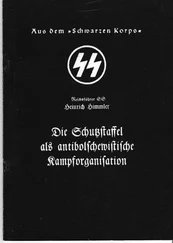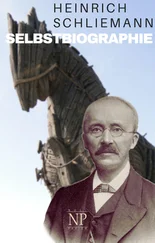In the middle of January 1937 Himmler was once more invited to address officers of the Wehrmacht during a course of political instruction designed to prepare them for the war which Hitler had decided was inevitable. 23He did not spare them the detailed explanation of his views. He began by tracing the history of the S.S. from its original formation in 1923 as shock troops to support Hitler, and its reformation in 1925 in squadrons set up in various cities to patrol meetings. But from these small beginnings, said Himmler, the noble ideal of an elite corps had sprung. ‘I am a strong believer in the doctrine that, in the end, only good blood can achieve the greatest, most enduring things in the world’, said Himmler. In recruiting his S.S. men:
‘only good blood, Nordic blood, can be considered. I said to myself that should I succeed in selecting as many men as possible from the German people, a majority of whom possess this valued blood, and teach them military discipline and, in time, the understanding of the value of blood and the entire ideology that results from it, then it will be possible actually to create such an elite organization which would successfully hold its own in all cases of emergency.’
For this reason, Himmler continued, very exacting standards were set for the recruiting of the S.S., including a minimum height, 1·7 metres, and the careful examination of portrait photographs by Himmler himself, who was determined to detect ‘traits of foreign blood, excessive cheek-bones’. Special burdens were placed on those selected — ‘valuable personnel is never trained by means of easy service’ — and in spite of the economic hardships of the time, the S.S. men were expected to provide their own uniforms. Now, in 1937, the ranks of the S.S. stood at 210,000; only one in ten of those who applied to join were accepted. When a young man of, say, eighteen years wanted to become an S.S. man, ‘we ask for the political reputation of his parents, brothers and sisters, the record of his ancestry as far back as 1750… . We ask for a record of hereditary health,’ and for ‘a certificate from the race commission’, which was made up of S.S. leaders, anthropologists and physicians, who conducted a full examination of the candidate. If he was only eighteen, the minimum age for consideration, he spent three months as an applicant, then after taking the oath to the Führer he became a recognized candidate for the S.S., spending a year obtaining his sports diploma and a further two years of military service in the regular Army. He then returned to the S.S. and was ‘with special thoroughness instructed in ideology’, learning among other things about the S.S. marriage law. Then, but only then, according to Himmler, was he finally accepted into the S.S.
Himmler did not refrain from putting himself on exhibition. ‘The Reichsführer of the S.S.,’ he said, ‘is just as much an S.S. man in the sense of the S.S. organization as the common man of the front. On this 9th of November he is being awarded the dagger, and this is the occasion when he promises to abide by the marriage law and the disciplinary laws of the S.S.’
Himmler then laid stress on the importance of good health. City life with its rush made men ‘grow pale and fat… which is never good for the State. If we desire to remain young we have to be sportsmen.’ He went on to describe how he expected men to practise in using both left and right hands equally in learning to fire pistols and rifles, or in putting the shot; everyone from eighteen to fifty years of age must train to keep fit.
Ideological training went along with physical training. ‘Weekly periods of instruction are held during which pages from Hitler’s Mein Kampf are read. The older a person, the more steadfast must he be in his ideology.’
He then described the various divisions into which the S.S. were divided, including the S.D.: ‘the great ideological Intelligence service of the Party and, in the long run, of the state,’ and the Death’s Head units, which ‘originated from the guard units of the concentration camps’. The prisoners in the camps he described as ‘the offal of criminals and freaks, for the most part, slave-like souls’. To attempt to indoctrinate such people was a waste of time; just to train them to keep themselves clean was as much as need be done. ‘The people are taught to wash themselves twice daily, and to use the tooth brush, with which most of them have been unfamiliar. Hardly another nation would be as humane as we are.’
After dealing with the objective of the Security Service, he turned to the S.S. marriage laws. ‘No S.S. man can get married without the approval of the Reichsführer S.S. A physical examination of the bride and guarantees for the bride’s ideological and human character are required. In addition, a genealogical table up to 1750 is required; this results in tremendous work. It is our concern that our men get married.’
He went on to describe how he was at that moment in process of unifying the German police system — ‘We now have for the first time in German history a Reich Police.’ The importance of the police in time of war was paramount, fighting in ‘a fourth theatre of war, internal Germany,’ against the insidious forces of ‘Jewish-Marxist-Bolshevist influence… It is the obligation of the S.S., and the police to solve positively the problem of internal security.’
He ended the speech with further references to the supreme racial struggle in which Germany was engaged:
‘We are more valuable than the others who do now, and always will, surpass us in numbers. We are more valuable because our blood enables us to invent more than others, to lead our people better than others. Let us clearly realize, the next decades signify a struggle leading to the extermination of the subhuman opponents in the whole world who fight Germany, the basic people of the Northern race, bearer of the culture of mankind.’
This speech, as the generals present must have realized, was a direct challenge to the Army and must have reminded them of Roehm’s assaults on their authority, though coming now from a source which was far more powerful, secret and sinister than anything Roehm had represented. The speech had the support of Hitler and was circulated, in a shortened form, as an official document, while the full text, taken down in shorthand, was smuggled abroad and published later in the year in an anti-Nazi journal. By that time, Hitler had favoured Himmler still further by announcing on 15 May that decisions issued from his office should have the same validity as ministerial decrees.
By the summer Berlin was seething with rumours that the S.S. were planning a putsch against the High Command. Fritsch, the Chief of Staff, was under surveillance by Heydrich’s agents, while Blomberg was about to cause his own downfall. When Hitler held his notorious staff conference on 5 November, neither the field-marshal nor the general was enthusiastic in response to his extraordinary outburst about the necessity for war with the Western Powers and the annexation of Austria and Czechoslovakia. When Blomberg, after consultations with Goring, approached Hitler with the request that he might marry a typist with whom, at the age of sixty, he had become infatuated, Hitler consented with good grace and, along with Goring, even acted as a witness of the wedding on 12 January 1938.
The main facts of the disgraceful sequel to this marriage are well known, though accounts differ considerably about the nature of the complicity of Goring, Himmler and Heydrich in Blomberg’s downfall. The dossier proving that the bride’s mother kept a brothel and revealing that Frau Blomberg had herself a police record for prostitution emerged immediately after the wedding from the office of Count Helldorf, the Police President of Berlin. When Helldorf saw it he decided not to give it to Heydrich; he tactfully took the papers first of all to General Keitel, Blomberg’s counsellor at the Ministry, whose son had recently married Blomberg’s daughter. Keitel refused point-blank to handle the matter, and it was decided the papers should be sent next to Goring. According to Gisevius, Goring had some knowledge of the matter from the start, though there is other evidence that contradicts this. Josef Meisinger of the Gestapo, before his execution in Poland in 1947, claimed that he had faked the evidence against Blomberg’s young wife, using her mother’s record for the purpose, and that only Heydrich knew the forgery was on file waiting to be used once the wedding was over. If this were so, it seems most unlikely that Himmler was unaware of it. Whatever machination was used, the result was the same; Blomberg was disgraced and forced to retire.
Читать дальше











